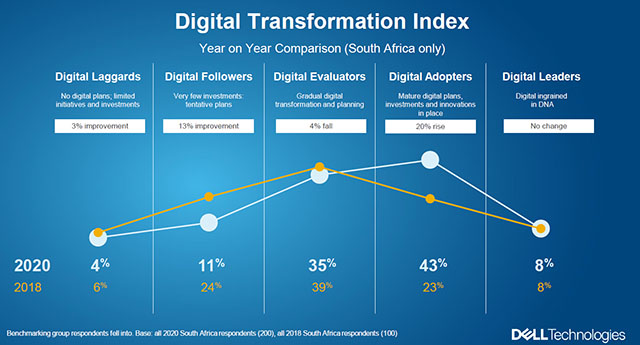Dell Tech: Here’s how the global pandemic is accelerating digital transformation in SA
By Ryan Noik 19 March 2021 | Categories: feature articles
Within every darkness there is a light, and for South Africa, it takes the form of the fact that due to the pandemic, organisations are accelerating their digital transformation programs. More heartening is the fact that those organisations are on the path to “fast-track technology implementation to drive long term business success.”
This is according to the findings of Dell Technologies’ recently released Digital Transformation Index 2020’ report.
The global study analyses and maps digital transformation progress of mid-to large-sized companies across the world, encompassing 5300 C-Suite respondents who were surveyed globally from 23 countries from a variety of industries and functions. Particularly illuminating for South African businesses, the index compares South African respondents with their global peers.
“The Digital Transformation Index 2020 survey for South Africa, undertaken in November and December 2020, is particularly pertinent as it clearly shows that organisations across the country, have already begun to roll-out significant digitalisation initiatives to drive business transformation,”commented Doug Woolley, the managing director of Dell Technologies South Africa.
“These initiatives will start to take shape in 2021. In many cases South African organisations surveyed are ahead of the global average and can be seen to be advocating digital transformation initiatives,” he continued.
As one of the first local studies to measure business behaviour amid the pandemic, the study found that 79% of South African organisations have fast-tracked some digital transformation programs this year. A further 84% are in the midst of re-inventing their business model, which is 5% more than the global average of 79%.
Despite these findings, only 23% of South African organisations are planning to invest in Virtual/Augmented Reality (greater than the global average of 16%), 44% intend to invest in Artificial Intelligence (also greater than global average of 33%) and a mere 20% plan to invest distributed ledgers in the next one to three years.
A new digital transformation curve
When comparing the South African results from 2018 till 2020, Digital Leaders (the most digitally mature organisations) have remained the same, at eight percent. Digital Adopters (the second most digitally mature group) have grown considerably from 23% in 2018 to 49% in 2020 – a 20% point increase. The Digital Evaluators (the third most digitally mature group, characterised by gradual digital transformation and planning) have seen a four percent drop between 2018 and 2020.
The South African study also records a modest drop (3%) in the number of Digital Laggards (the least digitally mature group) since 2018 and a fall in the second to last group, Digital Followers, by 13% points. These organisations are moving up, into the Digital Adopter group, which has expanded significantly.

Using a curve visual, the DT Index plots digital transformation progress in South African in 2018 vs 2020
Barriers to transformation
The pandemic may have catalysed digital transformation, but continuous transformation is proving difficult to sustain – globally, 94% of organisations are facing entrenched barriers to transformation. In South Africa, the barriers cited include:
- Lack of budget and resources (up from second place in 2018)
- Lack of economic growth (a new entry since 2018)
- Lack of the right technology solutions to work at the speed of business (a jump of four places since 2018)
Responding in an uncertain world
Prior to the pandemic, business investments were strongly focused on foundational technologies, rather than emerging technologies. The majority (84%) of South African organisations surveyed recognise that as a result of disruption this year, they need a more agile and scalable IT infrastructure to allow for contingencies. The findings also show that they are far more likely to invest in emerging technologies in the next one to three years than the global average surveyed, to become digital enterprises of the future (listed below in order of priority):
- 5G infrastructure (47%)
- Artificial Intelligence algorithms (46%)
- Real-time applications at the Edge (44%)
- Cybersecurity solutions (42%)
- Data management tools to transform data into something that is useful and protected (38%)
Recognising the importance of emerging technologies, a high proportion of respondents in South Africa (66%) believe remote learning will become more common in the next three to five years. This could pave the way for wider educational opportunities for employees and students in the country. In addition, 62% see data privacy emerging as a protected basic human right and 61% feel we will be part of a more globally connected, remote workforce.
Organisations in South Africa are also more likely to have completed their most recent round of investment in digital technology, including AI, Edge, Digital Services and Digital Workplace, when compared to their global peers. But it appears to be the greater rate of investment in Data Management and Analytics that South African organisations (49%) are better at predictively spotting new opportunities. Only 36% of global organisations are doing the same.
“Given the pace of change today and the constant risk of falling behind, we at Dell Technologies are enabling our customers to be more competitive, optimise costs and drive innovation,” concluded Woolley.
Most Read Articles

Have Your Say
What new tech or developments are you most anticipating this year?



